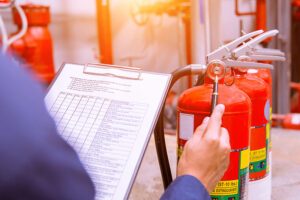SHP hears from Rob Sherman, Director of Fire Safety at Praxis42 on fire risk assessments and an analysis of what factors can determine competency when it comes to fire safety.

Rob Sherman, Director of Fire Safety at Praxis42
With the amendments to the Regulatory Reform (Fire Safety) Order 2005 (the ‘Fire Safety Order’ (FSO)) coming into force in January this year, I thought it was a good time to look at what the term ‘competent’ means when applied to fire risk assessments.
Although ‘competence’ has always been stipulated in the Fire Safety Order, Section 156 of the Building Safety Act 2022 has now amended the Fire Safety Order by stating:
The responsible person must not appoint a person to assist them with making or reviewing an assessment under article 9 unless that person is competent.
As a result of the Grenfell Tower tragedy of 2017, a fire risk assessment is now more comprehensive with a wider remit than before, so it is important to clarify ‘competency’.
As ‘competency’ is subjective, in this article we aim to clarify what it means in practice for the Responsible Person. The fire industry continues to drive for competency to be better defined, adhered to, and monitored.
Qualifications and registration
Section 156 of the Building Safety Act 2022 states that:
A person is regarded as competent…where the person has sufficient training and experience or knowledge and other qualities to enable the person properly to assist in making or reviewing the assessment.
Although there are no definitive qualifications that specifically demonstrate competence in carrying out a fire risk assessment, evidence of relevant qualifications and training courses can be a good indicator that somebody is competent.
However, not all qualifications carry the same weight, and it can be hard to tell if the certification is an indicator of competence, or merely demonstrates attendance on a course. If external assistance is required it is recommended that the Responsible Person selects someone who has third party certification.
It’s a good idea to check the dates on any certification and look for evidence of recent training and Continuing Professional Development (CPD). A qualification is a snapshot of a particular time, and with the Fire Safety Order bringing new elements to fire risk assessing, competent assessors will be looking to ensure their knowledge meets the new criteria.
We recommend making sure the risk assessor:
- Is experienced in carrying out fire risk assessments for your particular type of building.
- Maintains continuous professional development (CPD).
- Has professional certification.
- Meets the Fire Risk Assessment Competency Council’s competency criteria.
- Is registered and listed on the Fire Risk Assessors (FRA) Register.
The Fire Sector Federation has published guidance on choosing a competent fire risk assessor.
Experience
 It is essential that a potential assessor has up-to-date qualifications and experience of carrying out fire risk assessments. But neither guarantee competence. Does doing a job for a long time really mean that they’ve been doing it properly, and in this case, competently?
It is essential that a potential assessor has up-to-date qualifications and experience of carrying out fire risk assessments. But neither guarantee competence. Does doing a job for a long time really mean that they’ve been doing it properly, and in this case, competently?
External peer review and validation from more experienced assessors are key indicators of competence (see CPD below).
You should investigate the type of businesses and premises the potential assessor has been working on and collect references from previous clients whose needs most closely match your own.
Continued professional development (CPD)
Continued professional development is essential, particularly when you consider that most new fire assessors will have only completed a five-day course. This intense course provides underpinning knowledge, but to understand the full extent of the guidance behind it, and to build up experience in all the ways it can be applied can take a long time.
Fire risk assessors should engage in ongoing learning opportunities to expand their knowledge and expertise. This can involve attending workshops, conferences, seminars, and training courses related to fire safety and risk assessment. CPD helps assessors stay informed about the latest regulations, techniques, and technologies.
Competence can also be developed through:
Mentoring
Pairing a new fire risk assessor with an experienced professional can provide valuable guidance and support.
A mentor can share their knowledge, offer advice, and help the mentee develop their skills. Regular meetings or discussions with a mentor can be used to address questions, discuss challenging cases, and receive feedback on assessment reports.
Shadowing
Shadowing involves observing and learning from a more experienced fire risk assessor.
By accompanying a senior assessor on-site, the less experienced assessor can gain practical insights into the assessment process, including hazard identification, risk evaluation, and recommendations. Shadowing allows for direct learning through observation and facilitates the development of assessment skills.
Coaching
Coaching is where a skilled assessor provides one-on-one guidance to the less experienced assessor. The coach can help identify areas for improvement, set goals, and provide feedback on performance. Coaching sessions can focus on specific skills, such as conducting interviews, assessing fire safety systems, or writing comprehensive reports.
Peer review
Peer review can involve assessment reports or findings being reviewed by other fire risk assessors within the organization or professional community.
This process fosters constructive feedback, identification of potential errors or omissions, and the sharing of different perspectives. Peer review promotes quality assurance and helps assessors improve their work through collaboration and knowledge exchange.
Validation by an experienced assessor
A more experienced assessor can ensure the accuracy and reliability of assessments. They can review and validate the work of their less experienced colleague.
This validation process helps identify any gaps or inconsistencies in the assessment and provides an opportunity for the less experienced assessor to learn and develop.
A team approach
We recommend a team approach to fire risk assessment, with work being carried out by assessors with different levels of experience and areas of expertise.
If you are an assessor, being a mentor or coach is an indication that your expertise is recognised by your peers and is a great way to instil confidence in an organisation seeking to use your services.
Behaviour
 This brings us to something that is often overlooked when it comes to competency, and something that mentoring, shadowing and coaching can all have a positive influence on.
This brings us to something that is often overlooked when it comes to competency, and something that mentoring, shadowing and coaching can all have a positive influence on.
So far, we’ve been looking at ‘competency’ purely in terms of subject-matter and practical expertise. But that shouldn’t be the full extent of its meaning.
Expertise in the subject area should go hand-in-hand with the ability to report effectively, to relate to others, to present findings in the best way and in short, to be somebody others want to work with.
If you’re an organisation looking for an assessor, questions to identify positive behaviour attributes should be part of your reference request.
Know your limits
One of the key elements of competent behaviour is knowing your limits. Fire risk assessing is based on principles and reference points applied to new situations. As an assessor gains more experience, those reference points expand, particularly if he or she is working as part of a supportive team that shares knowledge and experiences.
But at some point, every assessor will come across a situation which is outside of their experience and knowledge. This is where a competent assessor will step back, and either seek additional experience, or let the Responsible Person know that he or she is unable to complete the assessment.
This isn’t an ideal scenario, but far better than an assessor attempting to muddle through without the necessary expertise, and consequently failing to identify dangers. The potential outcome in then could be much worse.
Quality counts
With organisations facing the very real need to reduce costs across their business, it can be hard to balance expertise against expense. Having a fire risk assessment team on a project rather than a single fire risk assessor can ensure a mix of experience and specialist knowledge, allowing the team to work more effectively in a range of situations. But of course, more assessors bring more cost.
The more traditional, single fire risk assessor approach helps to control these costs, but at a slower pace. With this approach there’s an increased likelihood that an assessor will need to call in additional help, or their work may be substandard but undetected.
There’s no easy answer here. With a smaller project and a clearly defined scope of work, a single assessor can be the solution. But larger, more demanding projects, across large multi-occupancy estates, for example, may require a team. The type of premises (a hospital for example) may need specialist expertise that your usual assessors simply don’t have.
There will always be the temptation to go for the cost-effective solution, but as with most things in life, you will get what you pay for. It can be far more costly to rectify the mistakes of a bad assessment, and unfortunately that cost isn’t always measured just in terms of money.
Fire Safety in 2023 eBook
SHP's sister site, IFSEC Insider has released its annual Fire Safety Report for 2023, keeping you up to date with the biggest news and prosecution stories from around the industry.
Chapters include important updates such as the Fire Safety (England) Regulations 2022 and an overview of the new British Standard for the digital management of fire safety information.
Plus, explore the growing risks of lithium-ion battery fires and hear from experts in disability evacuation and social housing.


 It is essential that a potential assessor has up-to-date qualifications and experience of carrying out fire risk assessments. But neither guarantee competence. Does doing a job for a long time really mean that they’ve been doing it properly, and in this case, competently?
It is essential that a potential assessor has up-to-date qualifications and experience of carrying out fire risk assessments. But neither guarantee competence. Does doing a job for a long time really mean that they’ve been doing it properly, and in this case, competently? This brings us to something that is often overlooked when it comes to competency, and something that mentoring, shadowing and coaching can all have a positive influence on.
This brings us to something that is often overlooked when it comes to competency, and something that mentoring, shadowing and coaching can all have a positive influence on.
Is NEBOSH Certificate in Fire Safety Course what a fire risk assessor need to be “competent” OR do you recommend other courses? Can you recommend other comprehensive courses?
I posted a question some time back on the IOSH chat pages about what courses are up to date and following on from the changes in legislation are any of the trainings currently on the market compliant to the updated legislation. I received the usual responses of, “its you who needs to keep up to date with the training” and “that’s what CPD is for”, however that isn’t correct. As someone else pointed out “the training courses being out dated with the legislation moved on so much, that answer (or excuse) would not stand up in court”. That comment i… Read more »
I have fairly recently reached out to various training providers and the FRA register to ascertain what course / courses are best for competency in completing a specific level of FRA’s. Nobody could give me a definitive answer. Everything was non-comital and very much a case of it depends on who or what body assesses the competence, as again there is no set requirement standards.